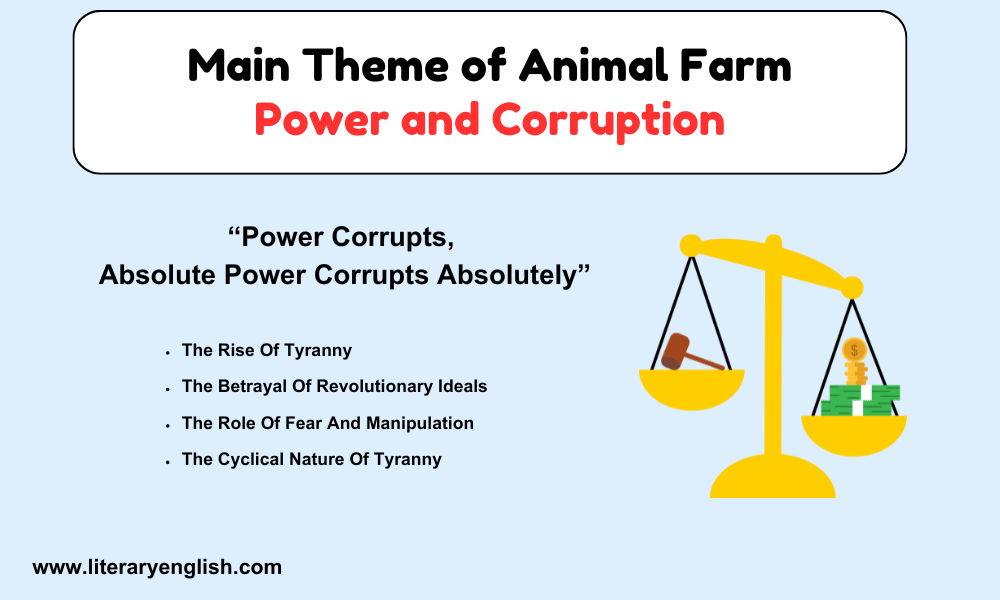The main theme of Animal Farm revolves around the corrupting nature of power and the dangers of totalitarianism. Through the allegorical portrayal of Manor Farm, Orwell explores how the pursuit of power leads to oppression, exploitation, and the betrayal of revolutionary ideals. The novel underscores the importance of vigilance in safeguarding democracy and resisting authoritarian rule. Additionally, “Animal Farm” examines themes of equality, justice, propaganda, and the cyclical nature of history. Overall, Orwell’s work serves as a cautionary tale about the perils of unchecked authority and the enduring struggle for freedom and social justice.
“Power corrupts, absolute power corrupts absolutely”
George Orwell’s influential work, “Animal Farm,” stands as a poignant exploration of the age-old adage, “power corrupts, and absolute power corrupts absolutely.” Through the allegorical depiction of Manor Farm’s transformation into an oppressive regime under the rule of the pigs, Orwell vividly illustrates the insidious nature of power and its corrupting influence on individuals and institutions. This article delves into the main theme of power and corruption in “Animal Farm,” analyzing its manifestation in the characters, events, and overarching narrative of the novel.
The Rise of Tyranny
At the heart of “Animal Farm” lies the transformation of a hopeful revolution into a totalitarian regime. Initially, the animals’ uprising against Mr. Jones symbolizes their quest for freedom and equality. However, as the pigs seize control and consolidate power, they succumb to the allure of absolute authority. Led by Napoleon, the pigs exploit their positions for personal gain, betraying the principles of Animalism and perpetuating a system of oppression reminiscent of the humans they overthrew. Orwell’s portrayal of the pigs’ descent into tyranny underscores the corrupting influence of unchecked power.
The Betrayal of Revolutionary Ideals
Throughout “Animal Farm,” Orwell highlights the betrayal of revolutionary ideals in the pursuit of power. The Seven Commandments of Animalism, initially conceived to uphold equality and solidarity, gradually erode as the pigs manipulate them to justify their own privileges. Squealer’s persuasive propaganda tactics and the rewriting of history exemplify the perversion of truth to maintain the pigs’ grip on power. Orwell’s critique extends beyond the farmyard to reflect the broader disillusionment with political movements that deviate from their original aspirations in favor of self-interest and control.
The Role of Fear and Manipulation
Central to the pigs’ consolidation of power is their manipulation of fear and intimidation. Napoleon’s use of the ferocious dogs as enforcers mirrors the tactics of authoritarian regimes, instilling terror to quell dissent and maintain obedience. Similarly, Squealer’s skillful dissemination of propaganda serves to distort reality and suppress opposition. Orwell underscores how fear and misinformation become potent tools in the hands of those seeking to perpetuate their dominance, reinforcing the theme of power’s corrupting influence.
The Cyclical Nature of Tyranny
As “Animal Farm” concludes, the pigs’ transformation into indistinguishable oppressors mirrors the oppressive regime they initially sought to overthrow. Orwell’s narrative reflects the cyclical nature of tyranny, wherein revolutions often give way to new forms of oppression. Through the tragic fate of the animals, Orwell warns against complacency and the dangers of failing to recognize the signs of authoritarianism.
Conclusion
In “Animal Farm,” George Orwell delivers a powerful indictment of the corrupting influence of power, epitomized by the pigs’ descent into despotism. Through allegory and satire, Orwell exposes the dangers of unchecked authority and the betrayal of revolutionary ideals. As readers confront the chilling reality of “Animal Farm,” they are reminded of the enduring relevance of Orwell’s cautionary tale in an ever-changing political landscape. “Power corrupts, and absolute power corrupts absolutely”—a timeless maxim that reverberates throughout Orwell’s seminal work, serving as a stark warning against the allure of unchecked authority.
Related Posts from Animal Farm
- Animal Farm in Historical Context
- Plot Overview of Animal Farm
- Introduction To Animal Characters
- Chapter-Wise Summary
- Symbolism in Animal Farm
- Animal Farm as an Allegory
- Character Analysis Of Old Major
- Snowball vs. Napoleon
- Symbolic Significance of Bleating Sheep
- The Song “Beasts Of England” In George Orwell’s
